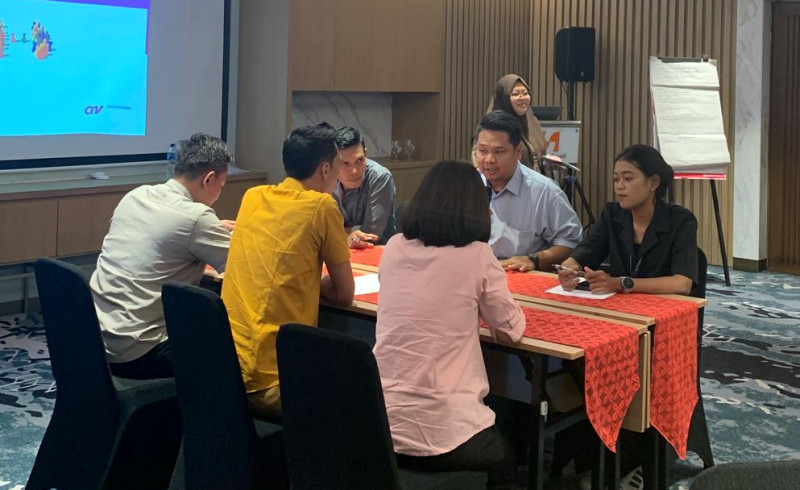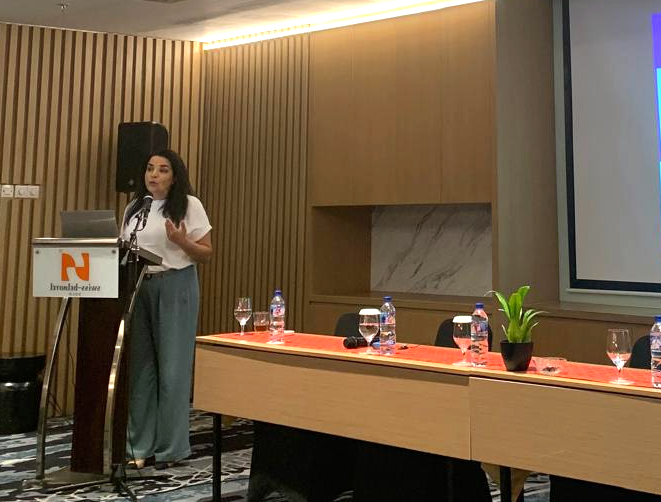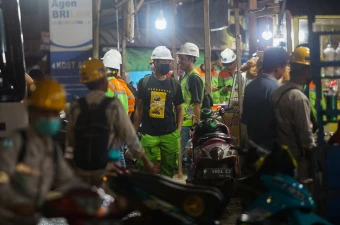Training for worker representatives and management of 14 garment factories
CNV Internationaal, together with CNV-trade union leader Hanane Chikhi and our local partner Yayasan Dialog Sosial (social dialogue foundation) recently organized a training in Indonesia on social dialogue and trade union freedom. Hanane exchanged her work in ports and public transport for textile factories in Indonesia for a few days. Participants in the workshops included not only worker representatives, but also the management of 14 garment factories.

Purpose of the training
We already have many years of experience conducting social dialogue trainings in Africa, Asia and Latin America. These trainings go beyond just teaching negotiation skills to both employees and employers. The ultimate goal is to strengthen communication between employers and employees in a safe training environment. Based on that, they can take follow-up steps, such as negotiating collective agreements that are embedded by improved working conditions.
Fear
The training was held in Central Java, a region of Indonesia where union presence in garment factories is still minimal. More and more brands are moving their production from West Java to Central Java. Unfortunately, this is not happening because of better conditions, but because wages are lower there. The fear of joining or forming a union prevails here: Many workers dare not join or form a union for fear of losing their jobs.

But, without unions, there are no collective bargaining agreements. Therefore, problems such as extreme heat in factories, lack of job security or failure to pay severance pay often remain unresolved. As a result, workers become increasingly vulnerable.
Building trust
All the more important was social dialogue training to change this. It started with the basics: building trust between employee representatives and management.
At the same time, we offered practical tools to set up dialogue at the plant level. Because ultimately, the goal of this training is capacity building at the plant level in the factory, so that workers and management are able to have a dialogue that eventually leads to a strong collective bargaining agreement.
Scoop for Hanane
It was a first for Hanane Chikhi. For the first time, she traveled to Indonesia as a union executive to facilitate the training. What are her impressions?
"What struck me most is how big the difference sometimes still is between employers and their employees. In my sectors, Ports and Public Transport, I am used to people speaking out, sometimes loudly and without restraint, when they disagree with something. The union is an established factor here. Workers know their way to participation and advocacy well. In Indonesia, that is clearly different."

Desire to be heard
"During the training I noticed that many employees are still reluctant to share their concerns or ask critical questions toward management. This reluctance stems from a combination of fear and a lack of experience with structured forms of consultation. At the same time, the desire to be heard does exist. Employees want better conditions, more security and fair treatment, but they often don't really know where or how to start."
Safe
"It made me realize how important it is to invest in basic skills such as negotiating, communicating and building trust. For this, the training provided an initial, safe environment to practice having a conversation on an equal basis. For many participants, it was literally the first time they engaged in dialogue with representatives of their management on shared workplace issues. That first step, however small, is essential."
Steps Ahead
"As a union executive, it was inspiring as well as confronting to see how much potential there is, but also how many steps are still needed to achieve true union freedom and structural consultation.
I hope that we were able to help them get started with this training. Because especially in a context where trade union freedom is under pressure, a first step can already make a big difference."
Intensive union work
Trade union work in Indonesia is high demanding. There is no such thing as an industry collective bargaining agreement; each factory must negotiate and register its own collective bargaining agreement. To facilitate this process, CNV Internationaal and CNV have developed with local unions the concept of the "multi-company" CBA: A CBA for more companies in the same industry and region, a successful way to make more impact. The video below shows how.
Watch our video to learn more
Publication date 27 05 2025


